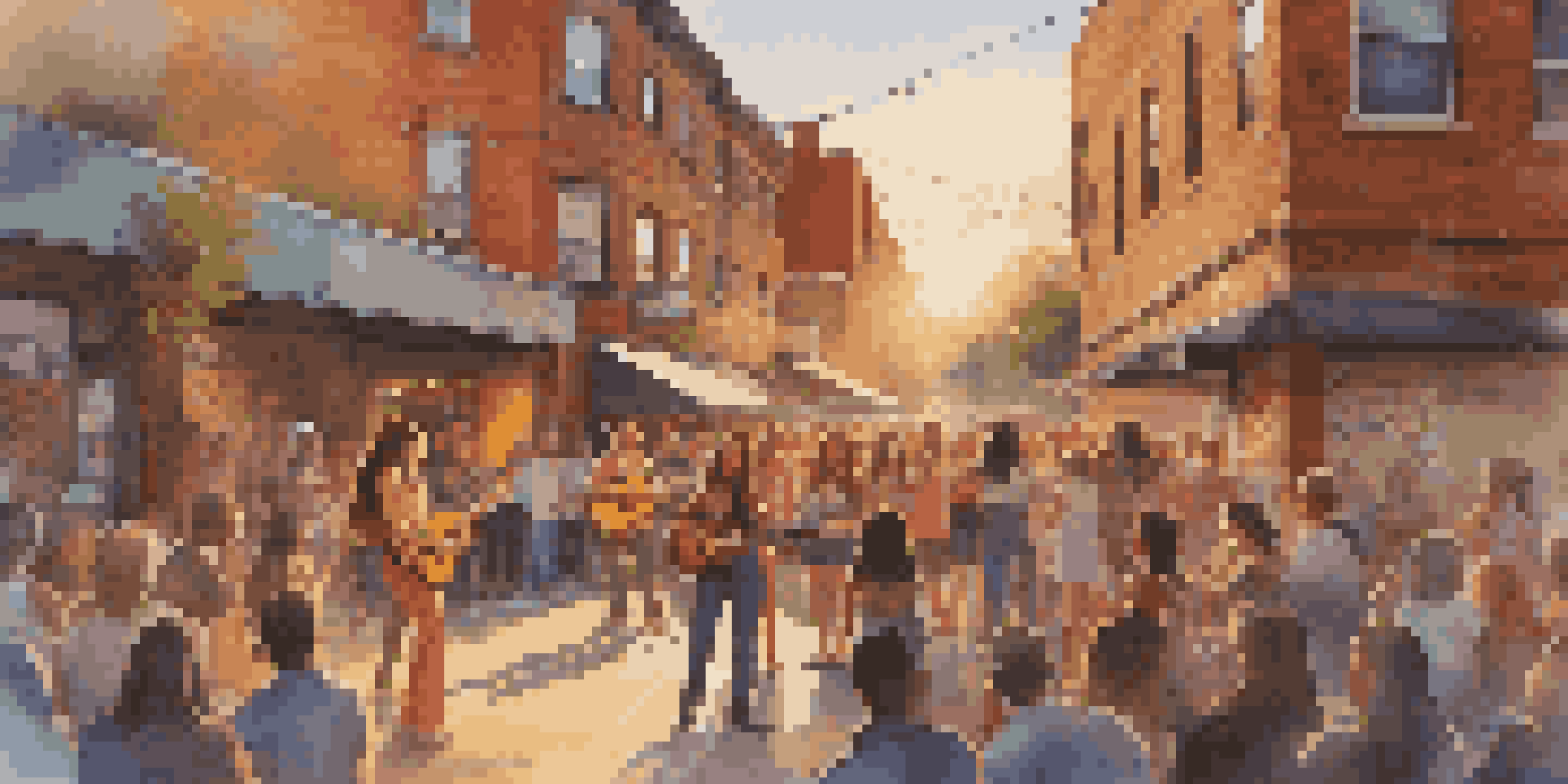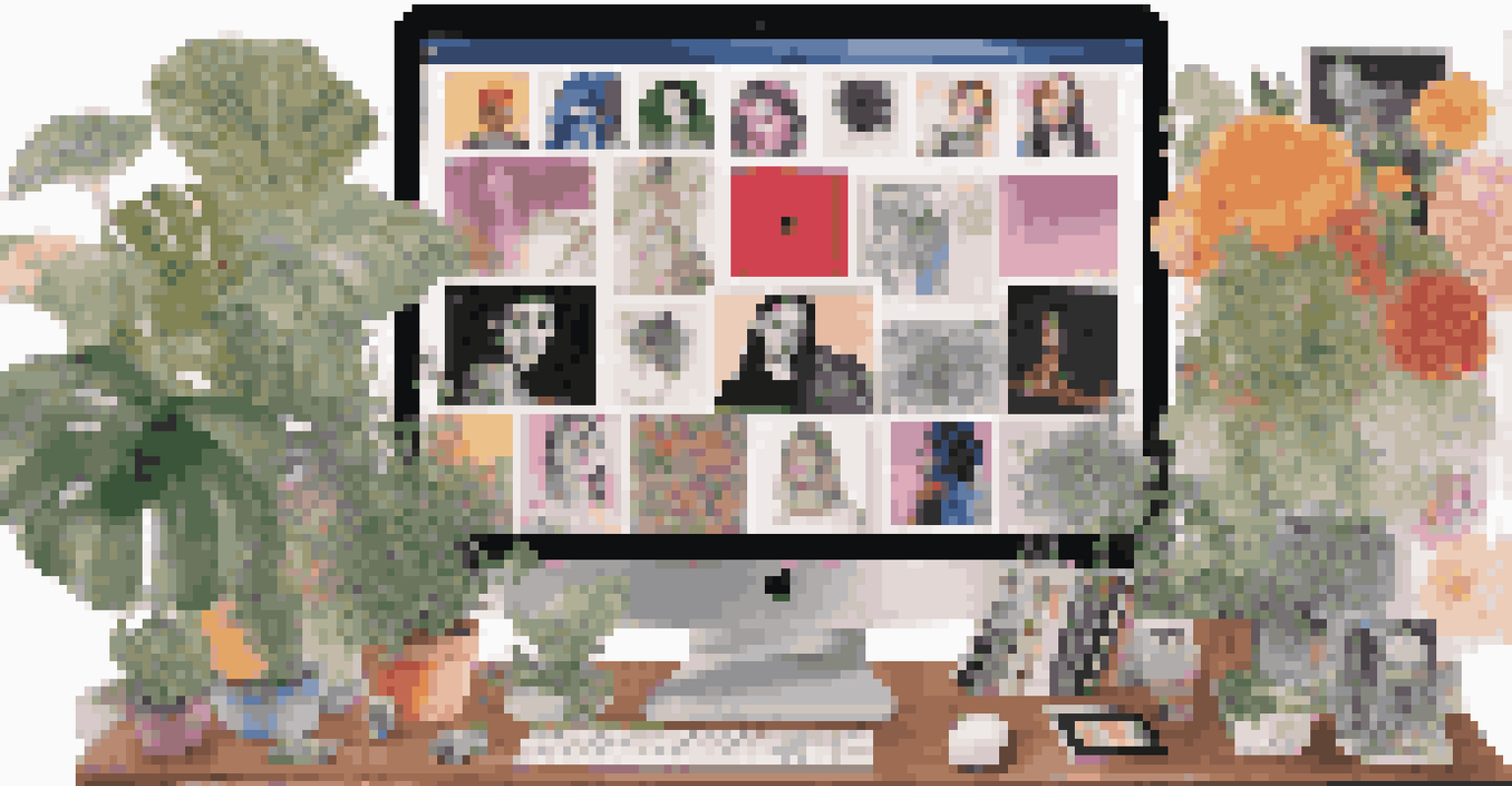How Digital Platforms Empower Female Musicians Globally

The Rise of Digital Platforms in Music Industry
In recent years, digital platforms have revolutionized the music industry, making it more accessible than ever. No longer do artists need a record label to share their music; platforms like Spotify, SoundCloud, and YouTube allow musicians to reach global audiences directly. This shift has created an environment where female musicians can showcase their talents without the barriers that once existed.
Music is the universal language of mankind.
With tools at their fingertips, women in music can easily upload tracks, share their stories, and connect with fans worldwide. This democratization of music distribution not only empowers female artists but also diversifies the musical landscape. As a result, we’re witnessing a wider array of voices and stories being told through music.
Furthermore, these platforms often provide analytics that help artists understand their audience better. This feedback loop enables female musicians to tailor their content and marketing strategies, ensuring they resonate with listeners, which is crucial for building a lasting career in music.
Social Media: Building Community and Support
Social media has become a pivotal tool for female musicians seeking to build a community around their art. Platforms like Instagram and Twitter allow artists to connect with fans, fellow musicians, and industry professionals in a more intimate way. This connectivity fosters a sense of belonging and support, which is particularly important for women in a traditionally male-dominated industry.

Artists can share their journeys, struggles, and triumphs, creating a narrative that resonates with their audience. For instance, when a female musician shares her challenges in the industry, it not only humanizes her but also encourages other women to pursue their musical dreams. This sense of solidarity can be incredibly empowering.
Digital Platforms Empower Female Artists
Digital platforms like Spotify and YouTube enable female musicians to reach global audiences directly, fostering a more diverse musical landscape.
Moreover, social media provides a space for collaboration among female artists. By networking online, they can team up on projects, cross-promote their work, and uplift each other, which strengthens their presence in the music scene and helps break down barriers.
Access to Funding and Resources
Digital platforms have also opened new avenues for funding and resources specifically for female musicians. Crowdfunding websites like Patreon and Kickstarter allow artists to raise money directly from their supporters. This financial backing can be vital for independent female musicians who may not have access to traditional funding sources.
The future belongs to those who believe in the beauty of their dreams.
These platforms help artists finance their projects, from recording albums to funding tours. With the support of fans, female musicians can take creative risks that they might not have been able to afford otherwise. This empowerment enables them to produce authentic work that reflects their unique perspectives.
Additionally, various organizations and initiatives now exist to support women in music, providing grants, mentorship, and workshops. Through digital channels, female musicians can easily apply for these opportunities and access resources that can enhance their skills and careers.
Breaking Geographic Barriers
One of the most significant advantages of digital platforms is their ability to transcend geographic barriers. Female musicians from various parts of the world can share their music with audiences far beyond their local communities. This global reach not only amplifies their voices but also introduces listeners to diverse musical styles and cultural influences.
For instance, a singer-songwriter from a small town can now gain an international following through platforms like TikTok or Bandcamp. This exposure can lead to opportunities that would have been impossible without digital access, such as invitations to perform at international festivals or collaborations with artists from different countries.
Social Media Fosters Community Support
Social media allows female musicians to connect with fans and fellow artists, creating a supportive network that encourages collaboration and growth.
Moreover, this global connectivity promotes cultural exchange and understanding. As female musicians share their stories and experiences through their music, they foster a richer dialogue among listeners, encouraging empathy and appreciation for diverse backgrounds.
Highlighting Female Talent and Representation
Digital platforms are increasingly prioritizing diversity and representation, actively promoting female talent in the music industry. Curated playlists, featured artist sections, and social media campaigns shine a spotlight on women in music, helping to counteract historical disparities. This visibility is crucial for inspiring the next generation of female musicians.
By highlighting female artists, these platforms not only elevate their profiles but also challenge the status quo in an industry that has often sidelined women. For example, initiatives like Spotify's 'Women in Music' playlist aim to showcase a range of female talent, from rising stars to established legends.
This representation matters because it creates role models for young girls who aspire to pursue music. When they see women succeeding in various genres and styles, it reinforces the idea that they, too, can carve out a space in the industry.
Empowerment Through Education and Skill Development
Digital platforms are also instrumental in providing educational resources for female musicians. Online courses, webinars, and tutorials make it easier than ever for artists to develop their skills, whether in songwriting, production, or marketing. This access to knowledge empowers women to take control of their careers.
For instance, platforms like MasterClass and Skillshare offer courses taught by industry professionals, allowing female musicians to learn from the best. This education is vital for building confidence and expertise, enabling them to navigate the complexities of the music industry with greater ease.
Education Enhances Career Opportunities
Access to online courses and workshops empowers female musicians to develop their skills and navigate the complexities of the music industry.
Additionally, many female-led organizations provide workshops and mentorship programs specifically designed for women in music. These initiatives not only teach valuable skills but also foster connections among aspiring artists, creating a supportive network that encourages collaboration and growth.
The Future: A More Inclusive Music Industry
As digital platforms continue to evolve, the future looks bright for female musicians. The ongoing push for inclusivity and representation is gaining momentum, and more women are stepping into roles within the industry, from producers to executives. This shift is creating a more balanced and equitable music landscape.
With technology advancing, opportunities for female musicians will only expand. Innovations like virtual reality concerts and AI-driven music creation tools are emerging, providing new ways for artists to express themselves and connect with their audiences. This technological progress will likely open even more doors for women in the industry.

Ultimately, the empowerment of female musicians through digital platforms is a collective effort. As audiences, industry stakeholders, and fellow artists continue to support and uplift women in music, we can anticipate a future where their voices are not only heard but celebrated on a global scale.